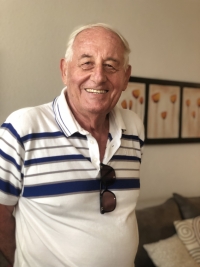Those who have not survived it, would never understand
Pavel Drechsler was born in Trnava on September 10, 1935, as the second child of Alexander and Elena Drechsler. His father, originally from Hlohovec, traded staple goods; the mother, originally from Galanta, was a housewife. After their father‘s deportation from the Jewish hospital in Nitra, he and his mother and brother Juraj emigrated to Hungary. They lived in Galanta, from where they managed to escape to Budapest, where they were transferred to the ghetto. They spent nine months in the Budapest ghetto until March / April 1945. After the liberation, they returned to Hlohovec. There they were in the Zionist Hashomer Hatzair movement in which Paul learned to read and speak Hebrew. The family gradually emigrated to Israel. In 1948, his brother emigrated, a year later Pavel, 14, and their mother Elena. Paul spent his youth in the kibbutz, and later worked for three years in the Israeli army, in which he received the rank of Staff Sergeant. During his life, he worked as a car mechanic. He married at twenty-four. He and his wife Tamar have three sons and live in Kiryat Haim.
